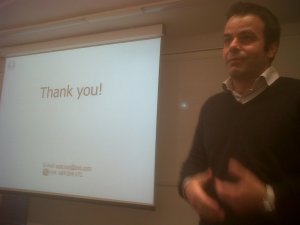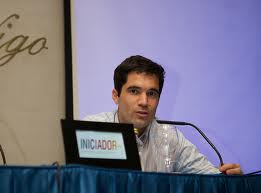Introduction
Looking at the hindsight on the completion of IETECHSTARTUP – “Managing the Tech Startups”, the course was surely a big milestone in my journey towards becoming a corporate entrepreneur. I always had the enthusiasm of driving new initiatives. But, my relative risk-averse nature had stopped me from getting into a traditional entrepreneurship concept. After coming to IE Business School, and learning about the idea of corporate entrepreneurship, I realized that this is the exact balance I have been looking for. Of course the rewards are relatively lesser. But, the risks are equally less too, which balances the equation. In the case of corporate entrepreneurship, a new initiative is driven within a larger enterprise by individuals. The idea can be run by resources within the authority of the individual, or further support can be sought from higher management. I was also engrossed by the aura of technology, and was sure that I will continue to work in technology industry after my graduation. When I joined the course of IETECHSTARTUP to learn about entrepreneurship within technology domain from Prof. Enrique Dans, one of the most popular professors at IE Business School, I was already excited about the opportunity. However, the challenge in front of me was to get all the learning of the course in context of traditional entrepreneurship, and translate all those to the context of the corporate entrepreneurship. My blog journal on this topic depicts my journey on this path of twelve very interesting sessions of IETECHSTARTUP.
Perceived Differences
There are surely some differences between traditional entrepreneurship and corporate entrepreneurship. Most of the differences revolve around the absolute cash values, and legal ownership patterns. However, to appreciate the beauty of parallel between corporate entrepreneurship and traditional entrepreneurship, it is important to look beyond the nitty-gritty of cash and ownership.
During the process of the generating funds for the initiative, a traditional entrepreneur has the option to get external funding initially by giving up some control, or to continue with self funding till the extent possible for higher valuation at later point in time. A corporate entrepreneur also has similar option. The entrepreneur can go to the higher management of the larger organisation for further funds, or can wait with funds available for the division or team to continue new initiative till the point it shows tangible results. In both the cases, the entrepreneur has the option between pushing the growth through increased growth, but this option dilutes the overall say of entrepreneur in decision making for the initiative.
There is also similarity in the case of final sale of the initiative. The corporate entrepreneur does not get 100% of profits from the initiative, or also does not benefit completely by exiting the venture through fundraising. However, the profits in case of corporate entrepreneurship can come in many different forms. Bonuses, better career growth, immediate promotion, higher equity options in parent company, etc. can be some common examples. The sale of an initiative brings benefits to both traditional entrepreneur as well as corporate entrepreneur.
Similarities
Most of the other factors remain exactly same in case of traditional entrepreneur, as well as corporate entrepreneur. Personal dedication towards initiative, best efforts, using tactics to break into a market, branding the product, developing online presence, positioning, building public relation and using media, choice between size and growth, and customer focus: all the factors remain exactly same for both corporate entrepreneurship and traditional entrepreneurship.
Entering into a market with existing competition can be a challenge for both traditional startups as well as startups within larger organisation. In both cases, the entrepreneur should understand the customer needs and offer differentiated product.
Both types of entrepreneurs should consider end-user experience as important. They should also ensure the strong backend support for the user experience. The decision of whether to keep the initiative small can be important for both corporate entrepreneur and traditional entrepreneur. The small initiative can help the entrepreneur to focus on the personalized customer service.
Online communities play an important for both traditional startups and startups within larger enterprises. Entrepreneur should consider identifying the community leaders who share interest, and are open to cheer for the specific offering of the startup. It is also important to encourage and recognize the community members.
Public Relations and media also play a very important role in all kinds of startup initiative. Whether the product is offered by a new startup, or by a new division within an existing company, the importance of building an active user community is very important. While building the user community, an entrepreneur should try to understand the user, and be ready to take feedback to improve the offering.
For both corporate entrepreneur and traditional entrepreneur, going commercial is an important phase in the life of startup. An entrepreneur should go extra mile to acquire first customer. Keeping the fixed list price of the product, even if huge discounts are given initially, can be a good idea as it retains the value of the product. The energy that is being put into the customer acquisition should also be commensurate with the size of potential customer client.
Internationalization of a product or service also poses equal challenge to both corporate entrepreneur and traditional entrepreneur. Strategy of internationalization should be given much thought by either. While considering new markets, it may be a good idea to consider the proximity of new markets. The main factor still lies around the product and the team. Most important point for the entrepreneurs is to ensure that product has strong fundamental customer value, so that it created differentiation for itself.
Maintaining work and life balance is also equally important factor for both corporate entrepreneur and traditional entrepreneur.
Both corporate entrepreneur and traditional entrepreneur can find it possible to start an initiative while continuing with the current responsibilities: may be a fulltime job for traditional entrepreneur and a current job role for corporate entrepreneur.
Working on traditional startup with friends can be compared with colleagues with whom a corporate entrepreneur shares good working relations. Involving close colleagues or friends may pose be a risk of getting alienated to those relationships for entrepreneurs.









